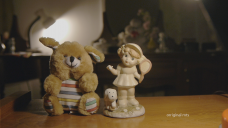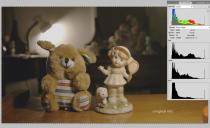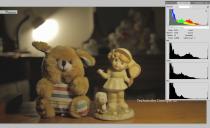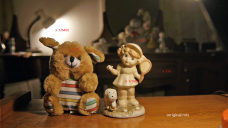
Dynamic range test between GH2 and 7D
-
This is a test I have been thinking of doing for a certain time. I have not seen one test of the gh2 video DR and it has always intrigued me. If you see some of my post, you will see that I give a lot of importance to DR, because in my mind the hacked gh2 is already very very good in terms of sharpness and detail, the low light is also quite good and the missing element was DR.
Now comes the Philip Bloom shootout and at first sight, it seemed that the gh2 was not as good as the cameras bar the AF-100. But looking closely at the 1080p embedded images seemed not as bad/far from at least the other DSLR. For copyright reason I did not want to show the example I toyed with and it was not good files (highly compressed jpeg) and had so many variables that I did not know, that the result would be inconclusive (it is not his fault he was doing a skin tone test).
So it revived my interest and as I had the time now I tried to conduct the test between a 7d that I bought for video (I a Nikon pro photographer) and the hacked gh2. At least the 7d has been tested and about 11 stop in the Zacuto shootout. So yesterday night I shot these test in a… controlled environment. Unfortunately I am no zacuto with backlit charts etc. But I think it is a good scene, with some highlight, middle tone and shadows. The light on directed at the wall is for the roll off and the dark part is for the detail into the shadows.
The 7d is in focus :-) I have check with a photo, just for everybody to be clear. I have used a Marvel cine profile and the Technicolor for the 7D. I have a Quantum 2 hacked gh2 and a mts file capture, a 5dtorgb 1.8 gama dxnhd 175 capture and a prores HQ from the beta 5dtorgb one. They were all shot at 1/50 sec shutter (I have done a set from 1/30 to 1/200 but have used this one for now) and ISO 160. The field of view is a little different (tried to match them) and use the same lens.
As a disclaimer, this test is for sharing it is in by no way to answer or compare to the Philip Bloom one. I do it because it is important for me to know what I am using; I like to know the good and the bad of the tools that I use, the same principle that I used for my photo camera Knowing the limit will help me cope in the different situation I will have to shoot. For sure anybody can like or dislike these tests but for me it is important, once you get the answers you can move to the next production level.
-
So first impression is that the Canon 7d is flatter and so better Dr, but the Cinestyle more so is already quite noisy. But look at the highlight in the background!!! So I used a curve simulation from the orriginal mts to match the cinestyle (mainly in the shadows) because it is difficult to match the highlight because the two camera curve are very different. But to the eye they match very well for luminosity because colours are quite different.
Another thing to note, is that the cinestyle does raise the black level a lot. The Marvel does not or only a little. Is it a good or bad thing, so say that it put the shadow above the compression level so preserve them, others say that they compress the info in an already low 8bit tonal range and thus create more banding.
The highlight seems to better in the gh2 case, there are more gradiation it seems even a little bit more banding.

 orriginal driftwood mts curve simulation cinestyle.png1920 x 1080 - 3M
orriginal driftwood mts curve simulation cinestyle.png1920 x 1080 - 3M
 histogram gh2.jpg1300 x 791 - 314K
histogram gh2.jpg1300 x 791 - 314K
 histogram cynestyle 7d.jpg1300 x 791 - 266K
histogram cynestyle 7d.jpg1300 x 791 - 266K -
what setting did you have the Gh2? I know Smooth and Nostalgic have a flatter more dynamic range. I use those.
-
Ah sorry forgot to say it was smooth and everything at -2.
-
its all good. Great Work!
-
is there a way to do multiple clips through 5DtoRGB?
-
You have the $ 50 5dtorgb batch but only for mac for now. So I can't use it as I am on PC.
-
Good stuff, @danyyyel and thanks for taking the time to do it and share.
Having been jumping between 5D, GH2 and RED recently I'd say this is pretty much about the same thing I've noticed. I dont' even like Cinestyle anymore, as grading it is a pain in the butt.
And man is the 7D soft... ugh. -
@CineHackDW176 Thanks
@Kholi , Thanks I hope it helps, by the number of reply it does not seem that interesting for personalview viewers ;-) perhaps if I did some random test and my name was a bit famous, it would have gathered more interest. Joking aside, it is very important to me. I am gasping a bit more what is in the raw material of the gh2 and how you can use/push/manipulate it. I did further test last night to evaluate the actual DR value of the scene. Will post below. -
@danyyyel , I think people are very interested in what the dr really is. Good work.
-
I have made some reading with my spot meter to get a better value of the DR of the scene. I have put an image below with the values in the speed of the shutter at different point (they were normalise to 400 Iso). So it span from 1/6400 to 1/6 which is 11 stop. Now I could no go lower than the 1/6 because my spot meter could not measure it (even at 3200 iso). I think you can get a good stop more differentiation in the shadows. The highlight also is a bit complicated because of the clipping point. I will have to see if I can measure where it clips exactly.

 orriginal driftwood dynamic range value.jpg1920 x 1080 - 537K
orriginal driftwood dynamic range value.jpg1920 x 1080 - 537K -
I post this other image because I could not remove the other one. The only difference is that I forgot about the value on the wall just above the bear ear. I have also posted a boosted image using photoshop shadow/highlight to show a bit more what is in the shadow. It is quite extreme to separate the different level in the shadows, it does not mean that they are usable, this needs discussion.

 orriginal dynamic range value 2.jpg1920 x 1080 - 539K
orriginal dynamic range value 2.jpg1920 x 1080 - 539K
 boosted orriginal driftwood mts.png1920 x 1080 - 6M
boosted orriginal driftwood mts.png1920 x 1080 - 6M -
DR will also decrease with higher ISO. ISO 160 should have the most DR going from similar tests.
-
They are 160 ISO, so as to remove any confusion about the numbers.
-
@adventsam, lets say that after 350 views, I was expecting a little bit more participation. I myself is experimenting, my method could be completely flawed etc... Even if it started as a comparison, there are many more thing to experiment and to learn for me about the gh2 image. If you look at the last boosted image, we can start to quantify how much we can dig into the shadows, so we could protect more our highlight in more contrasty lighting. We can also test about different ISO and the impact on DR.
I have made one test yesterday about what I would call lens DR. These test have use quite a contrasty Tamron 17-50, I have bought an old 28-90 vivitar 1 FD lens and look how it affected DR etc. So in the end we could know how to expose even for human being (overexpose, underexpose) for skin tone, at least what is a safe zone. Lets say that those thing are vital for me and was looking for such topic... until I had to do my own ;-) -
@danyyyel I like your tests, and this topic. I would say the image pushed in photoshop looks borderline unusable, but it is hard to tell without seeing motion. It may blend better as a sequence of frames.
I'm sure that pushing the darks just a little less would result in a usable image. -
It would be nice to add a grey card in your test to know where is the base of your exposure and to see how much highlight space we have there. It is good to know how much can we lift our shadows. Underexposing and then lifting to match a good exposed image.
-
@itimjim, sure it is more a tecnical test than an esthetic one. The shadow/highlight tool, in photoshop can be quite aggressive, it really separates the black (in this case) compared to a normal curve. Something like the image below would be more acceptable. But in motion the posterisation is much less visible because it is noise and very grain like. So it moves to the human eye looks smoother. Should get a way to post the mts. So anyone can play and test so that we can derive some conclusion about the level of push that would be acceptable. Sure the level of acceptable noise is a very subjective thing.

 orriginal driftwood mts test beauty.jpg1920 x 1080 - 628K
orriginal driftwood mts test beauty.jpg1920 x 1080 - 628K -
Nice test. Probably not a lot of participation because us GH2 cult members consider the 7d as a peasant's tool. We get interested when our beloved camera is matched against Red Epics and Arri Alexas.
I'm a little confused by your results, you got 11 stops from the GH2 or the 7d?
-
@brianluce I refered to the zacuto great camera shootout, where they measured the 7D to 11 stop of DR. like you can see here http://nofilmschool.com/2011/06/zacuto-unleashes-great-camera-shootout-2011/ so my guess is that the gh2 is not far from it, if mot better. My aim was to quantify from a known camera, because unfortunately the gh2 has nearly no proper test.
Unfotunately I have no red to compare it with and I have asked repeatedly if the people who had one could do it , but to no avail. Humbly I did take my time and some method to test it because the other people did not do the test, with what I had, be it the lowly 7d. Look at the philip Bloom test, it provoked a lot of reaction because at first sight it looked like the gh2 was beaten by every other camera except the Af100 in DR. With a little research I saw that it was not necessarily the case. So I device this test.
It is good to have some quantifiable test because it can stop the speculation. On one side you have people saying as if the gh2 the best thing since slice bread on the other they are always dishing it, someone was claiming not long ago that it was not resolving more than 600-700 line!!!!!!!!!! Look here another example http://www.dvinfo.net/forum/panasonic-lumix-gf-gh-series/503321-how-many-lines-resolution-gh2.html I just saw that yesterday, do you think it is real!!!!!!! Each and every place you find people saying "hey it has limited DR, small sensor, hey the highlight is not x or y". It is good with some test to put it in context. What it is and what it is not. At least someday when some people will claim that their Canon has better DR, perhaps someone will refer to this test if it is the case or not.
What I wanted after the first test was to see how much we could manipulate/push the image and shadows in particular. I just wanted to share it with the community hopping that that the ever, hey it has limited DR to my DSLR x,y or z. -
@andres Yes but I lost mine, I was planning to buy some small chart from BH, but as I live on the other side of the world, I have to wait when I am going to buy more things because if else the shipping is going to cost more than it. So when I saw the philip bloom test decided to do without.
-
@brianluce "Nice test. Probably not a lot of participation because us GH2 cult members consider the 7d as a peasant's tool."
I still have my 7D. It's great when you need a softer look. And I still like the menu layout better than the GH2...
Anyways, I'd love to be adding some examples to this thread, but my 7D is not with me at the moment...
@danyyyel "Look here another example http://www.dvinfo.net/forum/panasonic-lumix-gf-gh-series/503321-how-many-lines-resolution-gh2.html I just saw that yesterday, do you think it is real!!!!!!!"
Nope. Allot of people are threatened by a $800 camera that performs this well. Expect some vindictive testing... This is really the only site I trust anymore for accurate examples. Pretty much every other site just has a bunch of old Varicam and HVX users that are trying to protect their $40,000 2/3" camera investments and just aren't realizing how far behind proper "video cameras" are technology wise.
So although your test might just be quick and less technical, it's just much more trustworthy in the end... thanks!
@danyyyel " have made one test yesterday about what I would call lens DR. These test have use quite a contrasty Tamron 17-50, I have bought an old 28-90 vivitar 1 FD lens and look how it affected DR etc."
I'm really interested in this. In my own experience... If the GH2 (just as an example) had 10stops with Canon L series or Nikon glass, then it would have 8-9stops with Olympus, and then 7-8 stops with Panny glass. -
I believe the EX1 was using an external recorder.
-
> I still have my 7D. It's great when you need a softer look.
@bwhitz As is a gaussian blur -
@danyyyel the resolution chart you found echoes my experiences with the gh2's performance. I visually pegged it at around 800 TVL when compared to an XF300, so i would say that chart is accurate. It's still very very good, especially for a dslr.
Some have claimed that the gh2 resolves more than 1000 TVL, but that's unfortunately not correct. It wouldn't alias or moire at all if that were the case, but under the right circumstances it definitely will. -
@Ptchaw
I mean colors and such as well. The GH2 is overall more punchy like the Red MX. Even if you desaturate and gaussian blur the GH2 is still doesn't have the same look. I think of them like different film stocks...
7D is softer, more traditional, Kodak-stock look. GH2 is punchy and new-age digital cinema.
@cowpunk52 "It's still very very good, especially for a dslr."
This has absolutely nothing to do with how a camera performs image wise. A few DSLRs right now are much more advanced technology wise than video cameras. I don't see any "video cameras" downscaling from a 5k image besides the Alexa (which is really not a video cameras either). They're mostly native 1080p chips. And native chips NEVER resolve as well as a properly down-sampled image.
"Some have claimed that the gh2 resolves more than 1000 TVL, but that's unfortunately not correct."
No, you just don't want it to for one reason or another. But it does. I don't know where you're getting the 800 line measurement. The Zacuto test measured the 5D at around 800 lines. The GH2 is sampling a 5K image... it easily matches and/or out resolves any native sensor (like the EX3, as I've demonstrated). And the XF is not really close. I've been working with XF footage allot last week and it barley out resolves a 5D/7D... but it doesn't matter because the detail, even with it being sharper, looks worse and more digital.
Start New Topic


Howdy, Stranger!
It looks like you're new here. If you want to get involved, click one of these buttons!
Categories
- Topics List23,992
- Blog5,725
- General and News1,354
- Hacks and Patches1,153
- ↳ Top Settings33
- ↳ Beginners256
- ↳ Archives402
- ↳ Hacks News and Development56
- Cameras2,367
- ↳ Panasonic995
- ↳ Canon118
- ↳ Sony156
- ↳ Nikon96
- ↳ Pentax and Samsung70
- ↳ Olympus and Fujifilm101
- ↳ Compacts and Camcorders300
- ↳ Smartphones for video97
- ↳ Pro Video Cameras191
- ↳ BlackMagic and other raw cameras116
- Skill1,960
- ↳ Business and distribution66
- ↳ Preparation, scripts and legal38
- ↳ Art149
- ↳ Import, Convert, Exporting291
- ↳ Editors191
- ↳ Effects and stunts115
- ↳ Color grading197
- ↳ Sound and Music280
- ↳ Lighting96
- ↳ Software and storage tips266
- Gear5,420
- ↳ Filters, Adapters, Matte boxes344
- ↳ Lenses1,582
- ↳ Follow focus and gears93
- ↳ Sound499
- ↳ Lighting gear314
- ↳ Camera movement230
- ↳ Gimbals and copters302
- ↳ Rigs and related stuff273
- ↳ Power solutions83
- ↳ Monitors and viewfinders340
- ↳ Tripods and fluid heads139
- ↳ Storage286
- ↳ Computers and studio gear560
- ↳ VR and 3D248
- Showcase1,859
- Marketplace2,834
- Offtopic1,320





